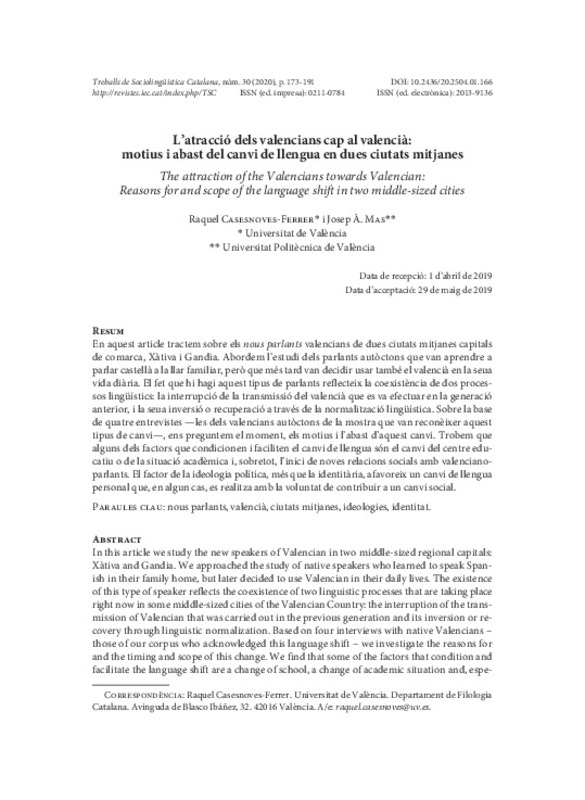JavaScript is disabled for your browser. Some features of this site may not work without it.
Buscar en RiuNet
Listar
Mi cuenta
Estadísticas
Ayuda RiuNet
Admin. UPV
L'atracció dels valencians cap al valencià: motius i abast del canvi de llengua en dues ciutats mitjanes
Mostrar el registro completo del ítem
Casesnoves-Ferrer, R.; Mas Castells, JA. (2020). L'atracció dels valencians cap al valencià: motius i abast del canvi de llengua en dues ciutats mitjanes. Treballs de sociolingüística catalana (Online). (30):173-191. https://doi.org/10.2436/20.2504.01.166
Por favor, use este identificador para citar o enlazar este ítem: http://hdl.handle.net/10251/200926
Ficheros en el ítem
Metadatos del ítem
| Título: | L'atracció dels valencians cap al valencià: motius i abast del canvi de llengua en dues ciutats mitjanes | |
| Otro titulo: |
|
|
| Autor: | Casesnoves-Ferrer, Raquel | |
| Entidad UPV: |
|
|
| Fecha difusión: |
|
|
| Resumen: |
[Otros] En aquest article tractem sobre els nous parlants valencians de dues ciutats mitjanes capitals
de comarca, Xàtiva i Gandia. Abordem l¿estudi dels parlants autòctons que van aprendre a
parlar castellà a la llar ...[+]
[EN] In this article we study the new speakers of Valencian in two middle-sized regional capitals:
Xàtiva and Gandia. We approached the study of native speakers who learned to speak Spanish in their family home, but later ...[+]
|
|
| Palabras clave: |
|
|
| Derechos de uso: | Reconocimiento - No comercial - Sin obra derivada (by-nc-nd) | |
| Fuente: |
|
|
| DOI: |
|
|
| Editorial: |
|
|
| Versión del editor: | https://doi.org/10.2436/20.2504.01.166 | |
| Código del Proyecto: |
|
|
| Tipo: |
|









